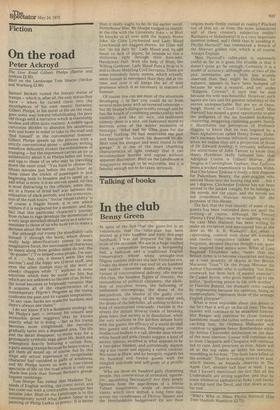On the road
Peter Ackroyd
The Low Road Gilbert Phelps (Barrie and Jenkins £2.95) Mott on the Landscape Tom Sharpe (Seeker and Warburg £2.90)
Samuel Beckett ruined the literary status of tramps — which is, after all, the only status they have — when he turned them into the mouthpieces of his own emetic fantasies; Gilbert Phelps, in his novel of life on the road, goes some way toward rehabilitating the poor old things with a narrative which is reasonably modest and often quite realistic. A middle-aged Cartoonist decides to abandon his salubrious wife and home in order to take to the road and 'find himself' in the conventional manner: Gilbert Phelps speeds up the process with a strictly conventional prose — ordinary writing somehow delicately evokes the ordinariness of tramping — but the experience carries an air of authenticity about it as Phelps ladles out hints and tips to those of us who may be travelling dawn the same road: -You have to choose the fifteen minutes just before the rush hour. At these times the trickle of passengers is just beginning both to broaden and to speed up and what is more, it is an uneven speed. All this is most distracting to the officials, when they are in a frame of mind half way between the relaxation of slack periods, and the concentration of the rush hours." Social 'respectability' is of course a fragile bloom, it is one which Withers if it is neglected for a moment, and the fact that this particular character's journey from riches to rags develops the momentum of a very large snowball should serve as a salutary reminder to those of us who have yet to make a decision about the matter.
But although our tramp (he steadfastly calls himself T through the book, which doesn't really help identification) comes to some imaginative focus, the succession of characters he meets along those golden miles do not: the "do-gooder" ("I've helped some people, I'm sure of it . . . but, yes, it doesn't seem like real success") and the hippy are 0-level stuff, and even the other tramps stay at the level of cheeky chappies while "I" wallows in some emotions which may be novel for him but which are not unknown to the rest of us. In fact, the novel becomes so helplessly romantic that it acquires all of the characteristics of a contemporary Pilgrrn's Progress as the tramp confronts the past and its various temptations: "In any case, backs are made for burdens, and there's always one there." I do not know if it's a deliberate strategy on Mr Phelps's part — certainly his relaxed and accessible prose suggests that he knows exactly what he is doing — but as his tramp becomes more enlightened, the narrative gradually turns into a depressed area The life and the detail disappear, to make way for a grotesquely symbolic saga about life, death and redemption heavily featuring a certain Sam, a guru among tramps because he hears voices. I got them all mixed up, of course, but by this stage any actual experience or recognisable character had vanished in puffs of windiness, and Mr Phelps leaves us with a rose-tinted spectacle of life on the road which is only one shade less pink than Samuel Beckett's grandiloquent ramblings.
Tom Sharpe has raided that Madame Tussauds of English writing, the comic novel, and has come out with a comfortable, nostalgic but amiable joke. Mott on the Landscape is to the contemporary novel what Ruskin Spear is to Painting or Philip Larkin to poetry. It is better than it really ought to be. In his earlier novel, Porterhouse Blue, Mr Sharpe nudged us sharply in the ribs with the University Joke — in Mott he knocks us all over with the Stately Home Joke. Sir ,Giles Lyrichwood and Lady Maud Lynchvvood are daggers drawn. Sir Giles will not -do his duty by" Lady Maud and, to add insult to lack of injury, he intends to run a motorway right through their hate-nest, Handyman. Hall. With the help of Blott, the Willing Gardener, Lady Maud Puts a Stop to It and to those Meddling Civil Servants. There are some extremely funny scenes, which actually seem funnier in retrospect than they did at the time, and over it all hangs the air of mild prurience which is so necessary in matters of humour.
Of course you can see most of the situations
developing in fact you could do so from several miles away with an inverted telescope — but Mr Sharpe's dialogue is nifty enough and he has the knack of combining predictability with risibility. And like all nice, old-fashioned comedy there is a nice, old-fashioned moral to buttress some of the wilder moments of nostalgia; -What had Sir Giles done for the future? Nothing. He had desecrated the past and betrayed the future. He deserved to die. Blott took his shotgun and went round to the garage." It is one of the more charming characteristics of light comedy that it can accommodate murder and rapine without apparent discomfort: Mott on the Landscape is imaginative enough to be enjoyable, and it is fanciful enough not to be taken seriously.
Talking of books


























 Previous page
Previous page